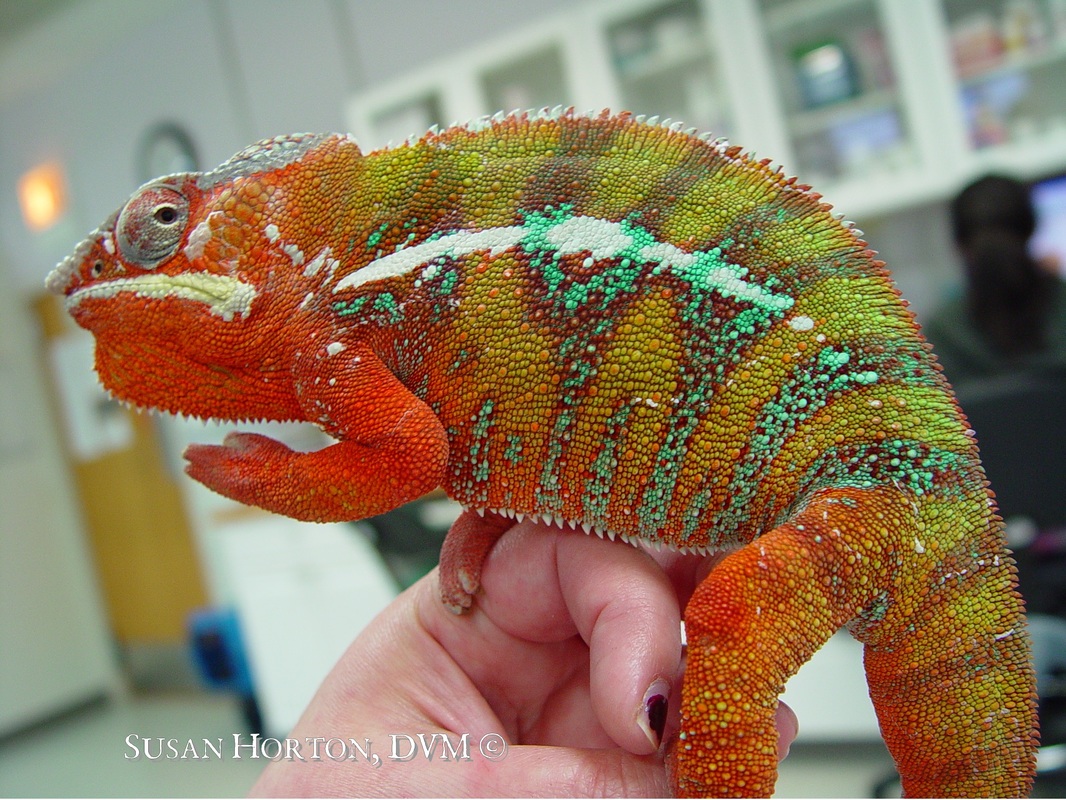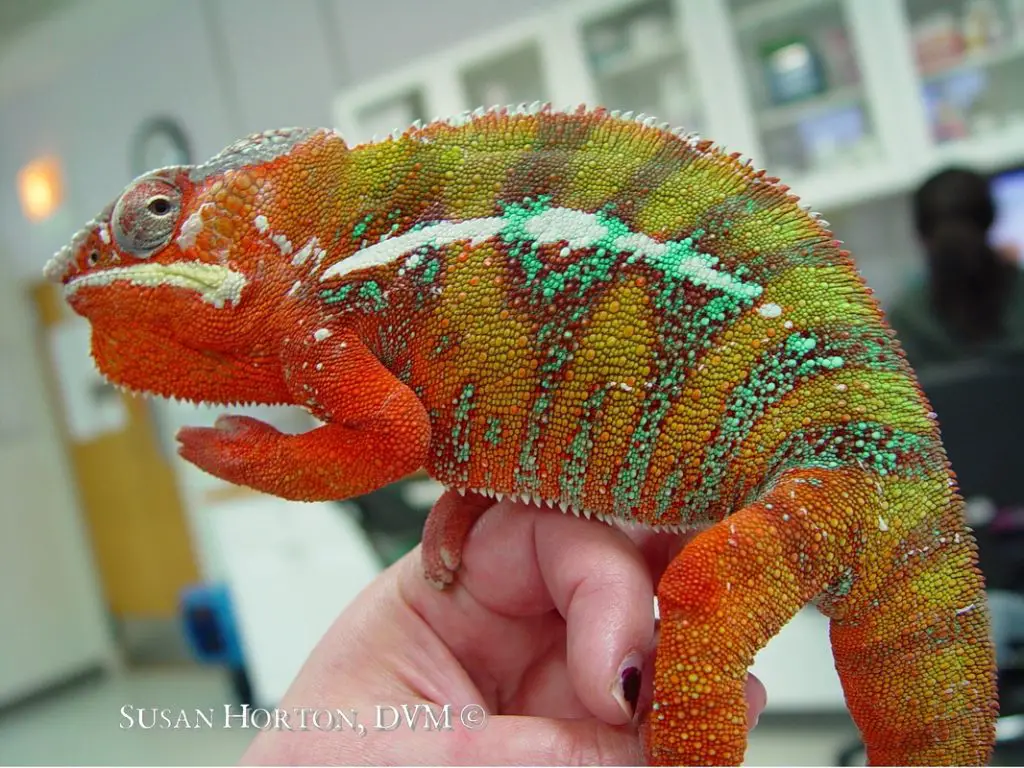Panther chameleons are fascinating creatures that are known for their vibrant colors and unique characteristics. However, there’s a common misconception about their behavior that has led many to wonder if they are aggressive animals.
Although panther chameleons are not typically aggressive towards humans, they may display aggressive behavior towards other chameleons or prey. In this article, we’ll take a closer look at the temperament of panther chameleons and explore the factors that can influence their behavior. So, let’s dive in and find out if panther chameleons are really aggressive animals or not.

Are Panther Chameleons Aggressive? – Understanding Their Behavior
Panther chameleons are one of the most popular species of chameleons that are kept as pets. They are known for their vibrant colors and unique patterns, but many pet owners wonder if they are aggressive animals. In this article, we will explore the behavior of Panther chameleons and answer the question, “Are Panther chameleons aggressive?”
Understanding Panther Chameleon Behavior
Panther chameleons are solitary animals and are primarily active during the day. They are arboreal, which means they live in trees and bushes. They use their long tongues to catch insects, which is their primary source of food. Panther chameleons are known for their color-changing ability, which they use to communicate with each other and regulate their body temperature.
Panther chameleons are territorial animals and can become aggressive towards other chameleons if they feel their space is being invaded. They are also known to be aggressive towards their prey, such as insects. However, when it comes to interacting with humans, Panther chameleons are generally docile and not aggressive.
Panther Chameleon Aggression: When It Happens
While Panther chameleons are not typically aggressive towards humans, there are instances where they may display aggressive behavior. This can occur when they feel threatened or stressed. For example, if a Panther chameleon is handled improperly or feels cornered, they may hiss, puff up their body, or even bite.
It is important to note that Panther chameleons have sharp teeth and their bite can be painful. Therefore, it is important to handle them with care and respect their space. If you are unsure about how to handle your Panther chameleon, it is best to consult with a veterinarian or a reptile expert.
The Benefits of Owning a Panther Chameleon
Despite their territorial behavior, Panther chameleons are fascinating creatures and make excellent pets for the right owner. They are relatively easy to care for and have a lifespan of up to 10 years. They also do not require a lot of space and can be housed in a terrarium.
Panther chameleons are also visually stunning, with their bright colors and unique patterns. They are an excellent addition to any reptile collection and can provide hours of entertainment.
Panther Chameleons vs. Other Reptiles
When it comes to owning a reptile, there are many options to choose from. However, Panther chameleons stand out for their unique characteristics and behavior. Unlike other reptiles, such as snakes or lizards, Panther chameleons require a specific environment, which includes UV lighting and a humid environment.
However, their unique needs are outweighed by their beauty and personality. Panther chameleons are interactive creatures and can provide a lot of joy and entertainment for their owners.
Caring for Your Panther Chameleon
To ensure your Panther chameleon remains healthy and happy, it is important to provide them with the proper care. This includes a suitable enclosure, a varied and nutritious diet, and regular veterinary check-ups.
Panther chameleons also require a specific temperature and humidity range, which can be achieved through proper lighting and misting. It is important to do your research and understand the specific needs of your Panther chameleon before bringing one home.
The Bottom Line: Panther Chameleons are Not Aggressive
In conclusion, Panther chameleons are not aggressive animals, but they can display aggressive behavior in certain situations. They are territorial creatures and can become aggressive towards other chameleons or their prey. However, when it comes to interacting with humans, Panther chameleons are generally docile.
If you are considering a Panther chameleon as a pet, it is important to do your research and understand their specific needs. With proper care and handling, Panther chameleons can make excellent pets and provide a lot of joy and entertainment.
Frequently Asked Questions
Are you curious about the behavior of Panther Chameleons? Check out these commonly asked questions to learn more about their temperament and aggression.
Are Panther Chameleons Aggressive?
Panther chameleons are not known to be aggressive towards humans. However, they can become territorial and defensive of their space. It is important to approach and handle them with care to avoid triggering defensive behavior. When threatened, Panther Chameleons may hiss, inflate their body, or even bite. These behaviors are typically a sign of discomfort or fear rather than aggression.
It is also important to note that male Panther Chameleons may display aggression towards other males during breeding season. This behavior is natural and intended to establish dominance and attract females. If you own multiple male Panther Chameleons, it is recommended to keep them separated during breeding season to avoid potential conflicts.
How Can I Tell If My Panther Chameleon Is Aggressive?
Signs of aggression in Panther Chameleons can include hissing, inflating their body, darkening of their color, and biting. However, these behaviors are not always a sign of aggression and can also be a sign of discomfort or fear. It is important to observe your chameleon’s body language and behavior to determine their mood. If your Panther Chameleon displays aggressive behavior, it is important to approach them with caution and try to identify the cause of their behavior.
Proper handling and socialization can also help prevent aggressive behavior in Panther Chameleons. Regular interaction with humans can help them become comfortable with handling and reduce their fear of people. It is important to approach and handle them gently and avoid any sudden movements or loud noises that may startle them.
Can Panther Chameleons Be Trained?
Panther Chameleons are not typically trained in the traditional sense, but they can be conditioned to tolerate handling and become more comfortable around humans. With regular positive reinforcement, such as offering treats or praise, they can learn to associate humans with positive experiences. However, it is important to note that they are still wild animals and may not always behave predictably.
It is also important to remember that handling should be kept to a minimum to avoid stressing or injuring your chameleon. Over-handling can also lead to aggressive behavior and should be avoided.
How Can I Prevent My Panther Chameleon From Becoming Aggressive?
The best way to prevent aggressive behavior in Panther Chameleons is to provide them with a comfortable and stress-free environment. This includes providing them with a spacious enclosure, proper lighting and heating, and a varied diet. Proper socialization and handling can also help prevent aggressive behavior.
If your Panther Chameleon does display aggressive behavior, it is important to identify the cause and address it accordingly. This may include adjusting their enclosure, providing more hiding spots, or reducing stressors in their environment. Consulting with a veterinarian or experienced chameleon owner can also provide helpful tips and advice on how to prevent and handle aggressive behavior.
What Should I Do If My Panther Chameleon Displays Aggressive Behavior?
If your Panther Chameleon displays aggressive behavior, it is important to approach them with caution and try to identify the cause of their behavior. Avoid any sudden movements or loud noises that may startle them. If their behavior is related to their enclosure or environment, make the necessary adjustments to reduce stress and improve their comfort.
If your Panther Chameleon continues to display aggressive behavior despite your efforts, it may be necessary to consult with a veterinarian or experienced chameleon owner for further guidance. In some cases, the behavior may be related to an underlying health issue or other factors that require professional attention.
Taming An Aggressive Panther Chameleon (Snake Island Exotics)
In conclusion, the idea that panther chameleons are aggressive is a common misconception. While they may display territorial behavior, especially towards other males, they are generally docile and make great pets for experienced reptile owners.
It’s important to remember that any animal has the potential to become aggressive if they feel threatened or mistreated. Proper care and handling, along with providing a suitable environment, can help prevent any potential aggression from your panther chameleon.
Overall, the key to a happy and healthy panther chameleon is to understand their unique needs and behavior. With the right care and attention, they can be a fascinating and beautiful addition to any reptile lover’s collection.


